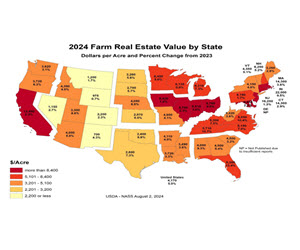Increased land values and rent impact agricultural finances
The U.S. Department of Agriculture (USDA) has released its annual Land Values Report, indicating a notable rise in the value of agricultural lands across the United States.
Economist Danny Munch of the American Farm Bureau Federation discusses the implications of these trends for the farming community.
The report reveals a 5% increase in agricultural real estate values, setting a new record at $4,170 per acre. Specifically, cropland values have increased by 4.7% to $5,570 per acre, while pastureland has seen a 5.2% rise to $1,830 per acre. These increases are accompanied by a 3.2% rise in cash rent for cropland, further amplifying the financial pressures on farmers.

Munch points out the double-edged nature of these developments. On one hand, higher land values can bolster farmers' assets, improving their leverage for obtaining loans.
The deceleration in value growth could lead to increased scrutiny from lenders, potentially labeling farmers as high-risk borrowers. Additionally, the hike in cash rents presents a challenge, potentially offsetting the benefits of increased land values by escalating operational costs.
This evolving scenario demands careful attention, as it could impact farmers' ability to cover rising production costs and maintain profitability amidst variable market conditions.
The ongoing changes underscore the need for robust financial planning and adaptive strategies within the agricultural sector.